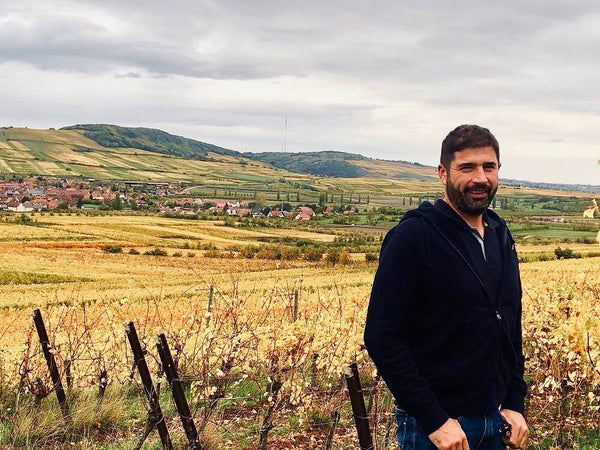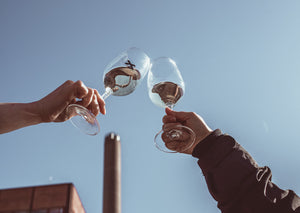
Domaine Loew
The medieval village of Westhoffen in northern Alsace is located just under 30 kilometers west of Strasbourg next to a large forest. More than 5,000 cherry trees grow in the village, but of course it is also known for its rows of vines. The Loew family has been farming in the area since the 18th century, but Robert and Yvonne Loew stopped wine production in the 1980s to sell the grapes they produced to the local cooperative. In 1996, their sincere and passionate son Etienne, together with his wife Caroline, started winemaking again on the farm, and now they are known as the best producer in Northern Alsace.
After graduating as an oenologist from the University of Dijon, Etienne received almost a hectare of vines from his father, and later took over the family's remaining 9 hectares. Year after year, Etienne and Caroline have planted more vines, grafting them from the cuttings of their previous vines, and today the farm has 14 hectares of vineyards. Etienne's dream would be to be a completely self-sufficient farmer who would never have to set foot in a grocery store, but at the moment, in addition to the vines, only a few chickens, goats and sheep live on the farm. After becoming a winegrower, Etienne also began to follow organic and biodynamic farming methods to show as much respect as possible to his land and vines, and to leave a healthy environment for his daughters Mathilde and Marguerite. Alsace is indeed one of the leading wine regions in France when it comes to viticulture that respects nature, as there are up to 70 biodynamic producers in the region today. The wines of the Loew farm are certified by both Demeter and Biodyvin.
Etienne and Caroline's orchards grow 7 different Alsatian grape varieties. There are six different soils in the nurseries located in five different villages, and there are also vines in two different Grand Cru nurseries, Altenberg de Bergbieten and Engelberg. The grapes in all orchards are picked by hand and 80% of the orchards grow on slopes, which is why mechanical harvesting would be impossible. During the harvest, Caroline and Etienne are assisted by local pickers, the oldest of whom has up to 30 years of experience picking grapes. The decision to start harvesting is made based on scientific accuracy, as the grapes are only harvested when their seeds have turned brown and their malic acid is in balance. The grapes are carefully selected so that the quality standards are met every harvest season.
In 2014, Drosophila suzukii wreaked havoc on the orchards, the hot and dry summer of 2015 produced extremely small and concentrated grapes, the 2016 harvest was small due to wine diseases brought by the rains, and the year 2017 was hot and dry again. For the first time in 2018, Etienne's orchards produced an average of up to 55-60hl/ha, although the figure is still far from the maximum permitted yield in Alsace of 80hl/ha. Due to the differences in vintages, the farm's annual production varies between 50,000-80,000 bottles and is distributed between up to 25 different cuvées. The cornerstones of both Etienne's garden and cellar work are patience and calm persistence, because even a tall and solidly built wine producer feels very small in front of natural phenomena.
The cornerstone of Etienne's winemaking is expressing the origin of the grapes. The wines are made without added yeasts and enzymes. As a pleasing and noteworthy fact, there is a row of steel tanks in the basement, the smallest of which is only 320 liters. With these, Etienne is able to ensure that the potential of each plot is revealed in the best possible way, and that none of the wines is a generic blend from many different vineyards. Etienne does not see long lees maturation or the use of new oak as meaningful and prefers residual sugar in his wines to excessively high alcohol concentrations. He also feels that sometimes the origin of the grapes comes out better in wines that haven't fermented completely dry. Biodynamic principles are followed not only when picking grapes on flower and fruit days, but also when racking and bottling the wine. The labels of the wines are decorated with the hermitage of Bruderbach, which reminds of Alsace's long history of viticulture.
https://domaineloew.fr/
Come and join us in creating a better wine culture
We at Viinitie believe that Finland is ready for a better wine culture. People are thirsty for quality, responsibility and stories in more and more glasses. That's why we want to be even more torchbearers of this cultural change and make better wines available to everyone.
Join the Viinitie Grand Crew community and you are involved in making a better wine culture.
Powered by Shopify © 2025, Viinitie Oy

